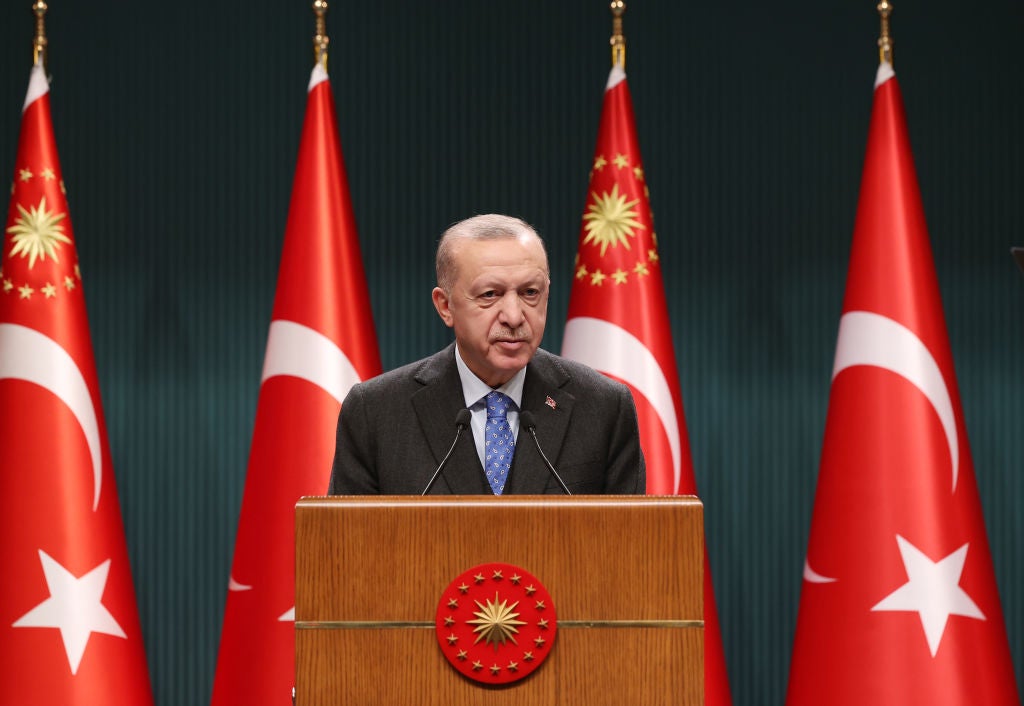
When Vladimir Putin gave orders to invade Ukraine on 24 February, many of the countries bordering Russia looked on nervously, and rapidly reassessed their own security policies. Those seeking protection against this renewed threat were forced to seriously consider Nato membership for the first time, and on 18 May both Sweden and Finland requested to join the alliance. The ratification of their membership had seemed a mere formality. Enter Turkish President Recep Tayyip Erdogan.
All 30 members of Nato must approve any new bids to extend the group, so Erdogan’s objections, citing that the two countries have been supportive of the Kurdistan Workers’ Party (PKK) – a Kurdish Marxist separatist movement that has sporadically been in conflict with Turkish forces since the 1980s – could end their hopes of joining the alliance before they have even started. Both Sweden and Finland have previously rejected Turkey’s request for the extradition of people with links to the PKK.
Erdogan has stated that Sweden and Finland will have to abandon the financial and political support they offer to what he views as terrorist groups that threaten Turkey’s national security. Only then will he consider withdrawing his veto for both countries to become members of Nato. The Defense Post reports that Erdogan has also told Swedish Prime Minister Magdalena Andersson to “lift restrictions imposed on Turkey in the defence industry” which came into force after the Turkish army’s Syria operations in 2019.
The FDI interplay of Turkey, Sweden and Finland
Such friction between countries can have an impact on investment levels, but there has been precious little such activity between Turkey and Sweden/Finland to dent. The GlobalData FDI Projects Database shows that Turkey was not even close to being among the top destinations for investments from Swedish and Finnish companies in 2019 and 2020.
Of the six greenfield projects announced or opened in Turkey by Swedish or Finnish companies in this period, Sweden was the source country of five and Finland of one.
Of the five Swedish projects, three were new and two were expansions. Of the three new projects, one was in business functions related to manufacturing, one in research and development, and another one in sales, administration and marketing. The two expansions were in construction materials.
Finland was the source country of one expansion project, where Upm Kymmene Kağıt Ürünleri Sanayi Ve Ticaret Limited Şirketi, a subsidiary of the Finland-based company UPM Kymmene, expanded its manufacturing operations in Istanbul. Upm Kymmene Kağıt Ürünleri is a manufacturer of graphic papers.
The strong level of opposition to Russia’s invasion of Ukraine, including from Turkey, has shown, in the West at least, a united force against Putin’s aggression. However, when the surface is scratched, divisions among those assisting Ukraine’s war efforts can be seen. Strained relations between Turkey and two Nordic countries – as demonstrated by their feeble investment levels – may seem like a minor issue, but as Erdogan’s posturing shows, they can have big repercussions. Whether Erdogan will get all of his demands met, with Sweden and Finland then ushered into the safety of Nato, remains to be seen, but the episode offers a reminder that just because two countries oppose Russia’s actions, that doesn’t necessarily make them allies.



